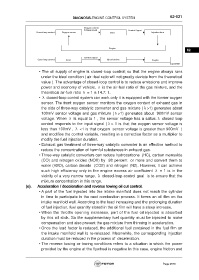Page 2573 - Foton Workshop Manual - Sauvana
P. 2573
DIAGNOSIS-ENGINE CONTROL SYSTEM 62-521
Oxygen content
Voltage signal Control Signal
λ Closed loop control: Oxygen sensor ECU Injection time
Engine
62
Control Signal
λOpen loop control: ECU Injection time Engine
fuwx62031
• The oil supply of engine is closed-loop control; so that the engine always runs
under the ideal condition ( air -fuel ratio will not greatly deviate from the theoretical
value ). The advantage of closed-loop control is to reduce emissions and improve
power and economy of vehicle. λ is the air-fuel ratio of the gas mixture, and the
theoretical air-fuel ratio λ = 1 is 14.7: 1.
• λ closed-loop control system can work only it is equipped with the former oxygen
sensor. The front oxygen sensor monitors the oxygen content of exhaust gas in
the side of three-way catalytic converter and gas mixture (λ>1) generates about
100mV sensor voltage and gas mixture (λ>1) generates about 900mV sensor
voltage. When λ is equal to 1 , the sensor voltage has a saltus.λ closed loop
control responds to the input signal (λ> 1 is that the oxygen sensor voltage is
less than 100mV , λ <1 is that oxygen sensor voltage is greater than 900mV )
and modifies the control variable, resulting in a correction factor as a multiplier to
modify the fuel injection duration.
• Exhaust gas treatment of three-way catalytic converter is an effective method to
reduce the concentration of harmful substances in exhaust gas.
• Three-way catalytic converters can reduce hydrocarbons (HC), carbon monoxide
(CO) and nitrogen oxides (NOX) by 98 percent or more and convert them to
water (H2O), carbon dioxide (CO2) and nitrogen (N2). However, it can achieve
such high efficiency only in the engine excess air coefficient λ = 1 is in the
vicinity of a very narrow range, λ closed-loop control goal is to ensure that the
mixture concentration in this range.
(e). Acceleration / deceleration and reverse towing oil cut control.
• A part of the fuel injected into the intake manifold does not reach the cylinder
in time to participate in the next combustion process. It forms an oil film on the
intake manifold wall. According to the load increasing and the prolonging duration
of fuel injection, fuel quantity stored in the oil film will have a steep increase.
• When the throttle opening increases, part of the fuel oil injected is absorbed
by this oil slick. So the supplementary fuel quantity must be injected to make
compensation and also prevent the gas mixture from thinning in acceleration.
• Once the load factor is reduced, the additional fuel contained in the fuel film on
the intake manifold wall is re-released. Meanwhile, the corresponding injection
duration must be reduced in the process of deceleration.
• The reverse towing or towing conditions refers to a situation in which the power
provided by the engine at the flywheel is negative In this case, engine friction and
Page 2573

